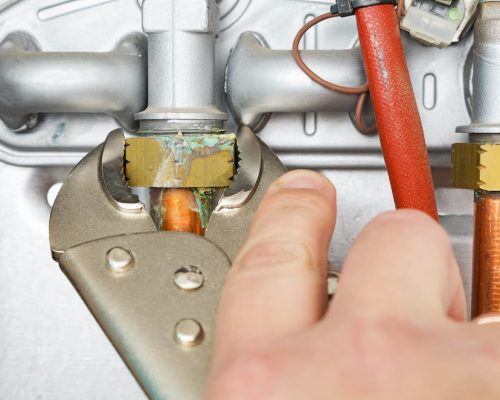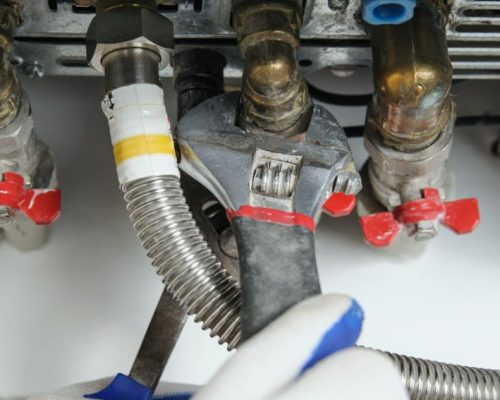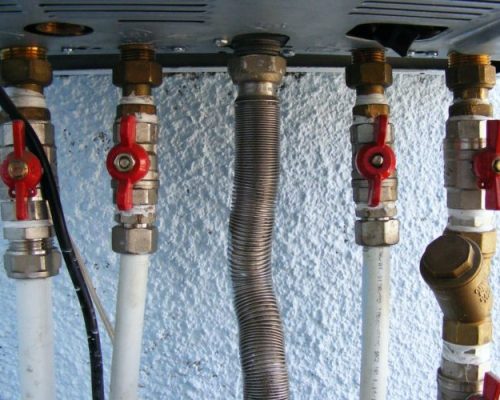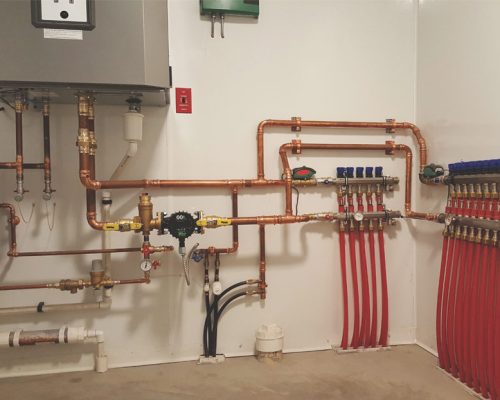Why is My Boiler Leaking Water?
A leaking boiler wants urgent attention from the heating engineer as it can cause serious damage. High pressure, broken seal or valve, corroded pipes and loose joints are all common factors behind the leakage. But if a newly installed boiler is leaking, the problem could be the result of poor installation.
You should not handle the issue yourself, but you can take a few measures to keep more water from leaking in your home:
- Disconnect the water supply
- Turn off the heating
- Clean out any water
- Reach out to a qualified engineer
Contact a Gas Safe registered engineer as soon as you detect the leakage from your boiler, as the leakage can lead to corrosion, rust, a short circuit, or problems across your residence, such as structural damage.
Is Leaking Boiler Really an Emergency?
To establish if the leak is an emergency situation, you should ascertain the cause of the leak first. The first question to ask yourself is whether you should repair or replace your boiler, the answer to which depends on the reason behind your leaking boiler and the type of boiler you have got installed. But if your boiler is 10-15 years old and suffering from corrosion, it may be time to purchase a new one.


What Causes the Boiler Leakage?
Several factors can be at play when your boiler leaks water. The root cause can be determined after spotting the point of leakage.
- Corrosion
- Too Much Pressure
- Temperature
- Faulty Heat Exchanger
- Loose Joints
- Internal Leakage
- Wear and Tear
- Poor Installation
Corrosion
Pipes or tanks that are corroded can begin to weaken, resulting in water leaving the pipes over time. If the corrosion is limited to a single pipe or valve, a simple replacement of the specific part will sort out the issue. But if the corrosion has extended throughout the boiler, it might be beyond repair, and you will have to get a new one installed.
Too Much Pressure
Like many other appliances, a boiler also cannot handle too much pressure. More pressure means the boiler is using more water than it needs to relieve to keep the system from imploding. High pressure on the pressure gauge will show somewhere above 2; an optimum pressure is between 18 and 21 PSI or 1 bar. Too much pressure can exacerbate things, but the good news is that you can monitor the pressure and control it as soon as you see the needle out of the desired range.
Temperature
A Temperature Control Valve (TCV) is fixed to a boiler to monitor the water temperature in the boiler and prevent it from getting too high. A leakage from the temperature valve indicates excessively high temperature, leading to the possibility of scalding water coming out from the taps.


Faulty Heat Exchanger
One of the most expensive components of your boiler, a heat exchanger transmits heat from gas to water. In old boilers, heat exchangers can get defective and prone to damage over time. A Gas Safe registered engineer can replace an out-of-order heat exchanger. But as mentioned earlier, the heat exchangers are expensive, and if the boiler is not insured or has got too old, you should consider getting a new boiler instead.
Loose Joints
The process of water expanding when heated and contracting when cooled leads to loose joints and pipe connections over time – part of the natural erosion over time. This requires tightening up of the joints to prevent any leakage.
Internal Leakage
Corrosion of seals and pumps can occur over time, which keeps the boiler from functioning optimally and leaves it sufficiently exposed to internal damage. Internal leaks can cause the boiler to swiftly leak water, leading to a major safety issue at your home. Get instant services of a Gas Safe registered engineer to have it fixed.
Wear and Tear
This is a common problem eventually faced by almost all boilers at some point in time. Usually, it is the age of the boiler – 10 years or more for instance – that results in the natural wear and tear. In such instances, it is best to install a new one. It will not only resolve the leakage issue but also lead to higher efficiency and lower bills.
Poor Installation
Sometimes, the cause simply boils down to the poor installation of the boiler. It usually manifests in leakage from pipe fittings.
In any case, call a trusted professional to handle your boiler woes, and do not venture to touch any component of the boiler or central heating system if you are unsure. Call us, and we can help. Our technical team will look into the issue and get your boiler running again.

